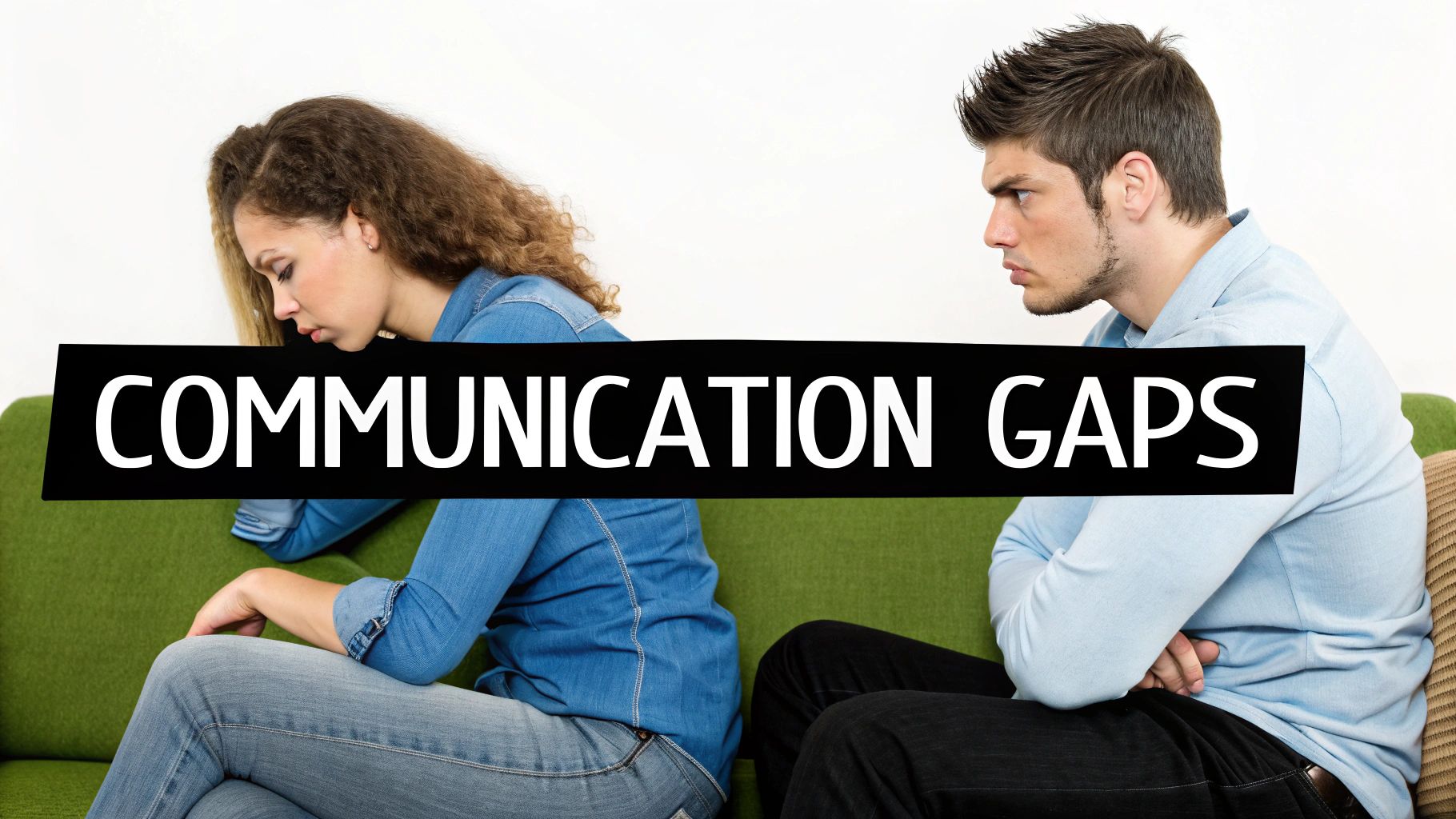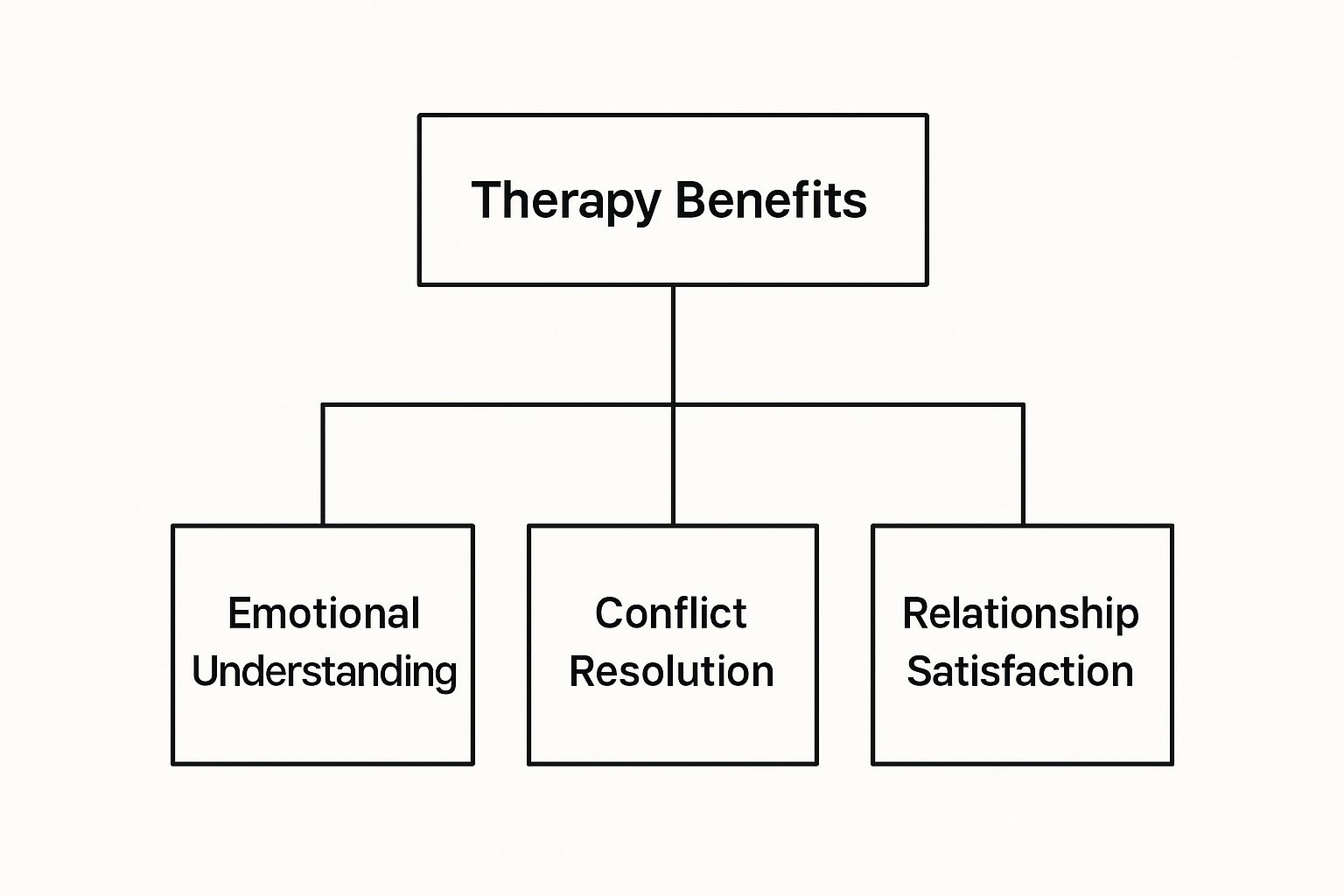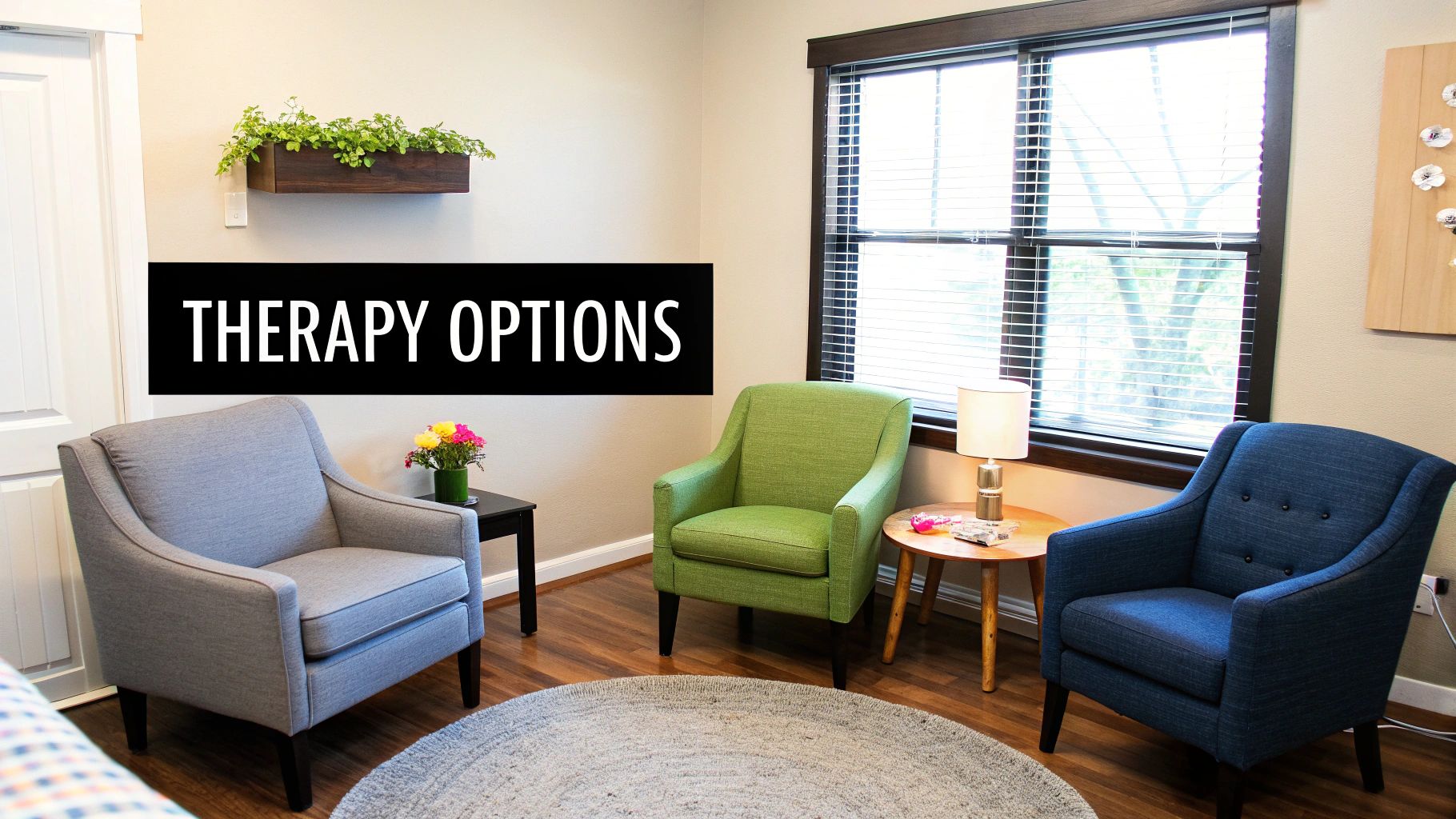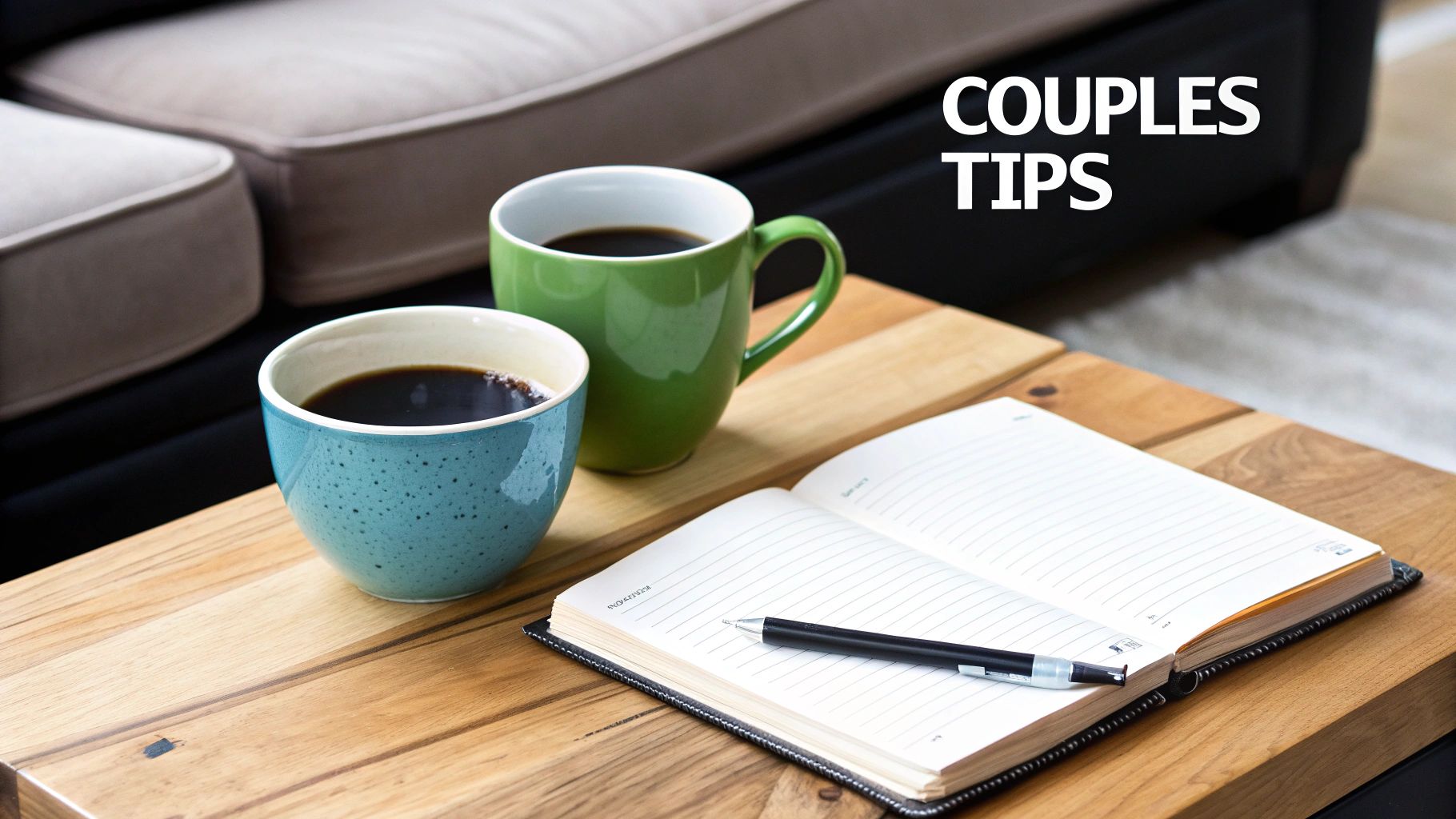Effective Therapy for Relationship Issues in the UK
- Therapy-with-Ben
- Sep 6, 2025
- 15 min read
It can feel incredibly overwhelming, even isolating, when you’re staring at the same old problems in your relationship. Therapy for relationship issues isn’t a last resort or a sign of failure; it’s a practical, powerful tool for building healthier, more meaningful connections. It offers a neutral ground to figure out what’s really going on with those recurring issues in communication, trust, or intimacy. More than that, it gives you the frameworks and skills for ongoing maintenance, helping you create a partnership that’s not just surviving, but thriving.
A Proactive Approach to Relationship Health
So many of us picture relationship therapy as this dramatic, final attempt to save a partnership that’s right on the brink of collapse. While it can absolutely be a lifeline during a crisis, that view really misses the bigger picture.
Think of it less like calling an ambulance and more like taking your car for a regular service. You don’t wait for the engine to completely seize up before you get an oil change, do you? You do the routine maintenance to keep it running smoothly for the long haul.
Therapy for relationship issues is built on the exact same principle. It’s a proactive choice to invest in the health and longevity of your connection. Whether you're a couple stuck in a cycle of conflict or an individual trying to understand your own patterns in relationships, therapy provides a structured, supportive space to explore and grow.
Who Is Relationship Therapy For?
This kind of support isn't just for romantic partners, either. It can be incredibly helpful for a whole range of connections, because at its heart, it’s all about improving how we relate to one another, communicate, and understand each other’s emotional worlds.
You might find therapy useful for issues related to:
Romantic Partnerships: Tackling everything from those minor, niggly disagreements that have become chronic to major breaches of trust.
Family Dynamics: Navigating conflicts between parents and children, siblings, or even sorting out issues with extended family members.
Friendships: Healing rifts, learning to set better boundaries, or coping with the painful end of a significant friendship.
Individual Patterns: If you keep finding yourself in the same negative cycles in different relationships, individual therapy can be a game-changer for understanding why.
Shifting the Mindset from Failure to Growth
There's a common and completely unhelpful myth that needing therapy means you’ve failed somehow. The truth is, seeking support is a sign of incredible strength and commitment. It shows that you value the relationship enough to learn new ways of interacting and solving problems together.
A therapist acts as a neutral guide, not a judge. Their role is to facilitate understanding and equip you with the tools to navigate challenges, helping you transform conflict from a destructive force into an opportunity for growth and deeper connection.
Thankfully, we're seeing a positive shift. The growing public awareness around mental health is helping to destigmatise getting support. More and more, people realise that therapy is just a normal part of personal and relational development. The UK mental health market was valued at approximately USD 14.78 billion, and it's forecast to reach USD 19.12 billion by 2033, which shows a clear trend towards prioritising psychological well-being.
This growth makes sense when you consider that 1 in 6 people in England report experiencing common conditions like anxiety or depression each week, which almost always have a knock-on effect on our relationships. You can learn more about the rising demand for mental health services and what it means for the UK on imarcgroup.com.
Recognising the Signs You Might Need Support

The moment you realise therapy might be a good idea rarely comes out of the blue. It’s not usually a single, dramatic event, but more of a slow burn—a gradual build-up of little moments that whisper something isn’t quite right. The key is learning to spot when a rough patch has settled into a persistent, draining pattern. That recognition is the first real step towards change.
Lots of couples know the feeling of being stuck in a loop. You find yourselves having the same argument over and over, just with different details. Maybe it’s about money one week and chores the next, but the underlying feelings of blame, defensiveness, or just shutting down are always the same. It’s exhausting, and it leaves both of you feeling completely unheard and misunderstood.
Communication Breakdowns and Emotional Distance
One of the biggest red flags is a breakdown in communication. Conversations that used to flow easily now feel like you’re trying to cross a minefield. Or maybe, even worse, they’ve just stopped happening at all. You might feel a growing emotional gap, that strange sense of being lonely even when you’re in the same room.
This emotional distance creeps in in subtle ways:
Avoiding difficult topics: You find yourselves constantly putting off important conversations because you’re afraid they’ll just lead to another fight.
Loss of intimacy: This isn’t just about the physical side of things. It’s the loss of shared jokes, easy affection, and the feeling that you’re each other’s biggest supporter.
Feeling misunderstood: There’s a nagging sense that your partner just doesn’t "get" you anymore, and you struggle to see things from their perspective, too.
When these patterns become the new normal, it’s a clear sign that the ways you used to connect just aren’t working. It’s also worth remembering that external pressures, like a stressful job or a family illness, can make existing cracks in the relationship feel much bigger, making it even harder to talk.
When Trust Has Been Damaged
Another critical moment is when you’re struggling to move past a breach of trust. It could be infidelity, financial secrets, or a series of broken promises—whatever the cause, a betrayal can leave a deep and lasting wound. Forgiveness is one thing, but rebuilding trust is a whole other challenge. It’s an active process that’s much easier to navigate in a structured, supportive environment.
Without some kind of intervention, resentment can take root and fester. This creates a toxic atmosphere of suspicion and hurt that makes it impossible for the relationship to move forward. A therapist can offer that crucial neutral ground, a safe space to work through the pain and build a clear path back towards that essential foundation of trust.
Seeking therapy isn’t an admission of failure; it’s a courageous decision to invest in your relationship’s future. It’s an acknowledgment that your connection is worth fighting for and that you’re willing to learn new skills to protect it.
What If Your Partner Isn’t Ready?
This is a common hurdle. One person sees the need for support, but the other is hesitant or just plain unwilling to go. It’s so important to remember you can’t force anyone into therapy. But that doesn't mean you're stuck.
Starting individual therapy for relationship issues can be an incredibly powerful first step. By working on your own patterns, your communication style, and how you respond emotionally, you can bring about significant positive changes in the relationship all by yourself. Often, when one person starts to interact differently, it can spark curiosity in their partner, making them more open to joining in later. Your personal growth can shift the entire energy of the partnership.
Exploring Different Therapeutic Approaches
Deciding to start therapy for relationship issues is a massive first step. But it almost immediately throws up another question: what kind of therapy is actually right for you? It’s easy to think all therapy is the same, but that’s a bit like saying all exercise is the same. Just as a personal trainer might focus on strength, endurance, or flexibility, different therapists use specific approaches designed to tackle different relational problems.
You don’t need to become a psychology expert to figure this out. The point is to feel empowered enough to find a style that just clicks with what you need. By getting a feel for a few of the main methods, you can go from being baffled by jargon to feeling confident about what might work for you.
Emotionally Focused Therapy (EFT)
One of the most effective and well-regarded approaches out there is Emotionally Focused Therapy, or EFT. A good way to think about it is to imagine your relationship is a dance. Over time, you and your partner might have fallen into a negative pattern—a sort of rigid, repetitive dance where you just keep stepping on each other's toes. You end up stuck in a frustrating cycle of blame, withdrawal, or criticism.
EFT helps you see this negative dance for what it is and understand the powerful emotions that are driving it. Instead of just trying to change behaviours on the surface, it digs deeper to uncover the unmet needs for connection and security that are really fuelling the conflict. The therapist acts almost like a choreographer, helping you create a new, more positive dance where you both feel emotionally safe and securely attached.

As you can see, each benefit of this process tends to build on the others, creating a positive feedback loop that strengthens the entire relationship.
Systemic Therapy
Another really powerful model is Systemic Therapy. This approach doesn't look at your relationship in a vacuum; it sees it as part of a much larger system. Think of your relationship like a single plant in a complex garden. Its health is affected by everything around it: the soil, the amount of sunlight it gets, the other plants, and even the weather.
Systemic therapy takes all these external factors into account. It looks at how your family histories, cultural backgrounds, work stress, and even your social circles influence your dynamic as a couple. A therapist using this method helps you connect the dots and see how these different parts contribute to the problems you're experiencing right now.
For instance, a recurring argument about money might not really be about money at all. A systemic therapist could help you explore how your different family upbringings and ingrained beliefs about financial security are clashing, giving you a much broader, more helpful perspective on the issue.
Person-Centred Therapy
The person-centred approach does exactly what it says on the tin: it places you, the client, right at the heart of the process. The core belief here is that you are the expert on your own life. The therapist's role isn't to dish out advice or tell you what to do, but to create a deeply empathetic, non-judgemental, and genuine space where you can explore your feelings and find your own way forward.
This style is particularly good for individuals seeking help with relationship issues because it's brilliant for building self-awareness and self-esteem. When you understand your own patterns and needs more clearly, you're in a much better position to show up in your relationships in a healthier way. If this sounds interesting, you can [read our complete guide on what person-centred therapy is and its key benefits](https://www.therapy-with-ben.co.uk/post/what-is-person-centred-therapy-key-insights-benefits).
To help you see how these different styles stack up, here’s a quick comparison.
Comparing Common Relationship Therapy Approaches
This table offers a simple, at-a-glance look at some common therapeutic modalities, what they focus on, and the kinds of issues they’re often best suited for.
Therapy Type | Primary Focus | Best For |
|---|---|---|
Emotionally Focused (EFT) | Identifying and changing negative interactional cycles; strengthening emotional bonds. | Couples stuck in high-conflict patterns, issues of trust and betrayal, or emotional disconnection. |
Systemic Therapy | Understanding the relationship within the context of family, social, and cultural systems. | Complex family dynamics, recurring intergenerational patterns, and problems influenced by external stress. |
Person-Centred Therapy | Creating a supportive space for individual self-exploration, growth, and self-acceptance. | Individuals wanting to understand their own role in relationship difficulties and build self-esteem. |
Cognitive Behavioural (CBT) | Identifying and changing unhelpful thought patterns and behaviours that impact the relationship. | Communication problems, specific behavioural issues like anger management, and managing anxiety in relationships. |
Of course, many therapists will blend elements from different approaches depending on what you need. The key thing is finding a professional and a style that feels right for you.
What to Expect From Your First Sessions

Walking into your first session of therapy for relationship issues can feel pretty daunting. It’s completely normal. The uncertainty of it all—what will happen, what you’re supposed to say, what the therapist will be like—can stir up a lot of anxiety.
The good news? This initial meeting is far less intimidating than you might imagine.
Think of it less as a formal examination and more as a mutual, get-to-know-you conversation. This first session, sometimes called an "intake" or "assessment," is really about two things: giving the therapist a chance to understand your story, and giving you a chance to decide if they feel like the right fit. It’s a two-way street; you’re interviewing them just as much as they’re getting to know you.
The Initial Conversation
Your therapist will likely start by covering the practical side of things, most importantly confidentiality. Everything you discuss is private and held in a safe space, which is the absolute cornerstone of effective therapy. Their first job is to create an environment where you feel secure enough to be open and honest without any fear of judgement.
From there, they’ll gently guide the conversation to learn more about you and your relationship. Let’s imagine a hypothetical couple, Sarah and Tom. Their therapist might begin with some open questions to start painting a picture of their world.
Common opening questions might include:
What brings you here today? This lets you share, in your own words, the challenges that prompted you to seek support.
Could you tell me a bit about your relationship story? This helps the therapist understand your history, from how you met to the key milestones you’ve shared along the way.
What are your hopes for therapy? This shifts the focus towards your goals and what a successful outcome would actually look like for both of you.
This is not an interrogation. It’s a collaborative process of mapping out the landscape of your relationship, identifying both its strengths and the areas causing distress.
Setting the Foundation for Change
During this initial phase, the therapist is listening for patterns. For Sarah and Tom, the therapist might notice that they tend to interrupt each other, or that one partner does most of the talking. These small observations provide valuable clues about their communication dynamics.
The goal of the first session isn't to solve all your problems. It is to establish a safe connection, gather information, and collaboratively create a roadmap for the journey ahead. You should leave feeling heard, understood, and with a sense of hope.
The therapist’s role is to make sure both partners feel equally heard. They will manage the conversation so that one person doesn't dominate, creating a balanced and fair environment right from the very beginning. This is a crucial first step in breaking those negative cycles.
You’ll also have the chance to ask any questions you have. This is your opportunity to clarify things about their therapeutic approach, their experience with issues like yours, or even practical details like scheduling and fees. Feeling prepared can make a huge difference, and you can explore some excellent [10 tips for therapy](https://www.therapy-with-ben.co.uk/post/10-tips-for-therapy) to help you get the most out of your experience.
Your Active Role from Day One
A common misconception is that you go to therapy for the therapist to "fix" you or your relationship. In reality, therapy is an active, participatory process. You are the experts on your own life and relationship; the therapist simply provides the expertise to help you navigate it differently.
From the very first session, you are an active participant. Your honesty, willingness to reflect, and openness to trying new ways of thinking and behaving are the most powerful ingredients for change. The therapist is a guide, but you are the ones who will walk the path.
By the end of this first meeting, you should have a much clearer idea of whether you feel comfortable with the therapist and, most importantly, hopeful about the process.
How to Find the Right Therapist for You in the UK
Deciding to start therapy for relationship issues is a huge step, and so much of your success comes down to the person you choose to guide you. Finding the right therapist isn't about ticking off the most qualifications; it’s about finding the right fit. It’s about discovering a professional with whom you feel safe, heard, and genuinely understood. That connection is the bedrock on which all the real work is built.
The search can feel a bit daunting at first, but breaking it down into manageable steps makes all the difference. If you start with the basics, like checking for professional accreditation, you can feel confident you’re in safe hands right from the get-go.
Start with Professional Accreditation
Here in the UK, counselling and psychotherapy aren't state-regulated, which makes it absolutely vital that you do a little homework on a therapist's credentials. Any reputable therapist will be registered with a professional body. This means they've committed to a strict ethical code and have met high standards for their training and practice.
Keep an eye out for membership in one of these key organisations:
The British Association for Counselling and Psychotherapy (BACP): One of the largest and most recognised professional bodies for therapists in the UK.
The UK Council for Psychotherapy (UKCP): A leading organisation for psychotherapists and psychotherapeutic counsellors.
Both of these bodies have online directories you can search. It’s a straightforward way to find registered professionals near you and double-check their credentials, giving you an essential layer of reassurance.
Where to Look for a Therapist
Once you know what you’re looking for, you can start the actual search. There are a few good places to find qualified therapists who specialise in relationship dynamics. Many people find curated online directories like Psychology Today or the Counselling Directory really helpful, as you can filter by location, what they specialise in, and the type of therapy they offer.
Don't overlook your GP, either. They can often refer you to local NHS services or might have a list of private therapists they recommend in the area. This can be a really solid starting point if you're not sure where to begin.
Key Questions for Your Initial Consultation
Most therapists will offer a free or low-cost initial chat, which is usually a brief phone or video call. See this as your opportunity to interview them and get a feel for whether they're the right fit for you. A good therapist will expect and welcome your questions, so don't hold back.
Think of this initial chat as a 'chemistry check'. You’re trying to figure out if their personality, communication style, and general approach feel right to you. Feeling a sense of comfort is just as important as their qualifications.
To make the most of this call, it helps to have a few questions ready.
Essential Questions to Ask:
Experience: "What's your experience in working with the kinds of issues I'm/we're dealing with?"
Approach: "Could you tell me a bit about the therapeutic approaches you use and how they might help my situation?"
Logistics: "What are your fees, how long are the sessions, and how often would you suggest we meet?"
Fit: "How would you describe your style as a therapist?"
This is also the time to think about what makes you feel comfortable. For some, the gender of their therapist can play a big role in how easily they open up. A BACP survey highlighted that while 76% of men would recommend therapy, they often face more stigma. In fact, only 29% of men have ever had therapy, compared to 41% of women. It just goes to show how important finding that personal connection really is. You can discover more insights on men's attitudes towards therapy at bacp.co.uk.
Choosing a therapist takes a bit of time and thought. If you're based in Gloucestershire, our guide on [finding the right Cheltenham therapist](https://www.therapy-with-ben.co.uk/post/finding-the-right-cheltenham-therapist) has some more local tips that might help. Ultimately, trust your gut—the right therapist will leave you feeling hopeful about the journey ahead.
Frequently Asked Questions About Relationship Therapy

It's completely normal to feel ready to take the next step but still have some lingering practical questions. Sometimes, that last bit of hesitation comes from simply not knowing what to expect.
Getting clear, straightforward answers to these common queries can give you that final piece of confidence you need to start your journey with therapy for relationship issues.
How Much Does Relationship Therapy Cost in the UK?
The cost of relationship therapy really does vary quite a bit across the UK. The main things that affect the price are the therapist's level of experience, their location, and whether they are working in private practice.
As a general guide, you can expect to pay anywhere between £60 and £150 per session. Some therapists offer a sliding scale, which means they can adjust their fees based on your income to make support more accessible. It’s also worth knowing that charitable organisations like Relate often provide more affordable services. The important thing is to confirm all the fees during your first chat so there are no surprises down the line.
What If My Partner Refuses to Go to Therapy?
This is an incredibly common situation, and it can feel pretty disheartening. While having both partners in the room is often ideal for couples' work, it is far from the only way to make progress. In fact, you can achieve significant, positive change by attending on your own.
When you come to therapy by yourself to focus on relationship dynamics, you get the space to understand your own patterns, sharpen your communication skills, and learn how to manage conflict more effectively.
It's empowering to focus on your own role in the relationship. When you change how you show up, you naturally change the dynamic between you and your partner, which can often inspire them to become more open to the process over time.
Your personal growth can shift the entire energy of the partnership, creating a healthier environment for both of you.
How Long Will We Need to Be in Therapy?
There really is no "one-size-fits-all" answer for this. The length of time you'll be in therapy depends entirely on your specific goals, the complexity of the issues you're facing, and the pace you feel comfortable working at.
If you're tackling a single, well-defined problem, a shorter-term approach of around 6-12 sessions might be enough to give you the tools you need. But for deeper, long-standing patterns of conflict or disconnection, a longer-term commitment will likely be needed to create lasting change. Your therapist will discuss a potential timeline with you, and this is something that can always be reviewed and adjusted as you go.
Is Online Relationship Therapy as Effective as In-Person?
For many people, yes, it absolutely is. Online therapy has proven to be just as effective as traditional face-to-face sessions for a lot of individuals and couples. It offers huge advantages in convenience and accessibility, removing geographical barriers and making it much easier to fit into a busy schedule.
Ultimately, the most critical factor for success—no matter the format—is the strength of the relationship you build with your therapist. The best choice is simply the one that you feel most comfortable with and can commit to consistently.
If you are considering therapy to improve your relationships and overall well-being, Therapy with Ben offers a supportive and non-judgemental space in Cheltenham. Ben provides face-to-face, online, and unique walk-and-talk therapy sessions designed to help you navigate life's challenges. Get in touch to learn more and book your initial consultation.









Comments